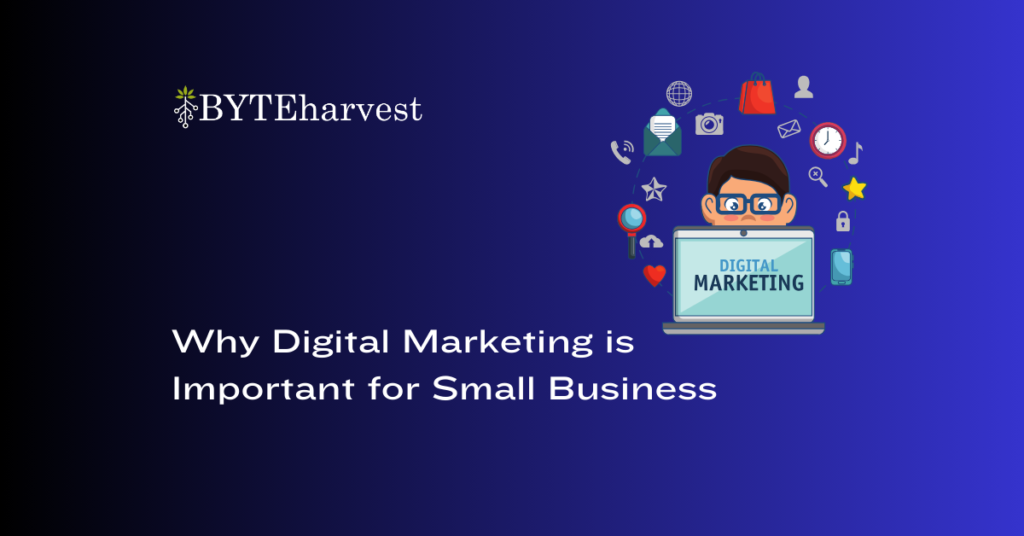In today’s fast-paced digital world, small businesses are discovering the transformative power of digital marketing. This comprehensive guide explores why digital marketing is important for small businesses and how it can revolutionize their growth trajectory. Whether you’re a seasoned entrepreneur or just starting out, understanding and leveraging digital marketing strategies can be the key to unlocking your business’s full potential, especially because marketing is essential for small enterprises.

1. The Digital Revolution: Why Small Businesses Must Embrace Online Marketing
Digital marketing has completely changed the landscape for small businesses, leveling the playing field and allowing them to compete with larger corporations. This section explores the shift from traditional marketing methods to digital platforms and why it’s crucial for small business owners to adapt.
2. Demystifying Digital Marketing: Essential Strategies for Small Business Success
Here, we’ll break down the various types of digital marketing and how they can be tailored to suit small businesses. From content marketing to email campaigns, learn how to craft a comprehensive digital marketing plan that works for your business.
3. Cost-Effective Reach: How Digital Marketing Stretches Your Marketing Budget
One of the primary benefits of digital marketing for small businesses is its cost-effectiveness. This section delves into how digital marketing allows small businesses to reach a wider audience without breaking the bank, making it an ideal choice for those with limited marketing budgets.
4. Targeting and Personalization: Reaching the Right Audience at the Right Time
Digital marketing provides unprecedented opportunities for targeting and personalization. Learn how small businesses can use digital channels to connect with their ideal customers, delivering tailored messages that resonate and drive conversions.
5. Measurable Results: Tracking and Optimizing Your Digital Marketing Efforts
Unlike traditional marketing methods, digital marketing offers robust analytics. This section explores how businesses can track their progress, measure ROI, and continuously optimize their marketing campaigns for better results, emphasizing why digital marketing is essential for continuous improvement.
6. Building Brand Awareness and Credibility in the Digital Space
Discover how digital marketing allows small businesses to build a strong online presence, establishing credibility and fostering trust with potential customers. We’ll discuss strategies for creating a cohesive brand image across various digital platforms.
7. Engaging Customers: The Power of Social Media and Content Marketing
Social media platforms and content marketing are essential tools in the digital marketer’s arsenal. Learn how these strategies can help small businesses engage with their audience, build communities, and drive customer loyalty.
8. SEO and SEM: Boosting Your Online Visibility
Search Engine Optimization (SEO) and Search Engine Marketing (SEM) are crucial for small businesses looking to increase their online visibility. This section provides insights into these techniques and how they can help your business get found online.
9. Mobile Marketing: Reaching Customers on the Go
With the increasing use of smartphones, mobile marketing has become essential for small businesses. Explore strategies for optimizing your digital marketing efforts for mobile users and capturing this growing market, because digital marketing is essential in an increasingly mobile world.
10. The Future of Digital Marketing: Staying Ahead of the Curve
As technology evolves, so does digital marketing. This final section looks at emerging trends and technologies in digital marketing, helping small businesses prepare for the future and stay ahead of the competition.
Now, let’s dive deeper into each of these aspects of digital marketing for small businesses.
1. The Digital Revolution: Why Small Businesses Must Embrace Online Marketing
The digital marketing landscape has revolutionized how businesses connect with their customers. For small businesses and start-ups, this shift presents both challenges and unprecedented opportunities. Digital marketing is important for small businesses because it levels the playing field, allowing them to compete with larger businesses in ways that were previously impossible.
Traditional marketing methods, while still relevant in some contexts, often require substantial investments that may be out of reach for many small business owners. Digital marketing, on the other hand, offers a more accessible and cost-effective alternative, illustrating why digital marketing is an essential investment. It allows small businesses to reach a global audience, target specific demographics, and measure the success of their marketing efforts in real-time.
The importance of digital marketing for small businesses cannot be overstated. In an era where consumers increasingly turn to the internet to research products and services before making purchasing decisions, having a strong online presence is no longer optional – it’s essential. Digital marketing provides small businesses with the tools to not only be found online but also to engage with potential customers, build brand awareness, and drive sales.
Moreover, digital marketing is flexible and scalable, making it particularly suited to the needs of small businesses. Whether you’re operating on a shoestring budget or ready to invest more heavily in your marketing efforts, there are digital marketing strategies that can work for your business. This adaptability is crucial for small businesses that need to be agile and responsive to market changes.
2. Demystifying Digital Marketing: Essential Strategies for Small Business Success
Digital marketing encompasses a wide range of tactics and channels, each with its own strengths and applications. For small businesses, understanding these different types of digital marketing is crucial to crafting an effective digital marketing strategy.
Content marketing is a cornerstone of many successful digital marketing campaigns. This involves creating and sharing valuable, relevant content to attract and engage a clearly defined audience. For small businesses, content marketing can be an excellent way to showcase expertise, build trust, and drive organic traffic to your website.
Email marketing remains one of the most effective digital marketing channels, offering a direct line of communication with your audience. Small businesses can use email marketing to nurture leads, promote products or services, and keep customers informed about company news and offers.
Social media marketing is another essential component of digital marketing for small businesses. Platforms like Facebook, Instagram, and LinkedIn offer opportunities to connect with customers, build communities around your brand, and even sell products directly through social commerce features, showcasing the digital marketing techniques that can drive success.
Search Engine Optimization (SEO) is crucial for improving your website’s visibility in search engine results. By optimizing your site’s content and structure, you can attract more organic traffic and potential customers.
Pay-Per-Click (PPC) advertising, such as Google Ads, allows small businesses to display ads to potential customers based on specific keywords or demographics. This can be an effective way to drive targeted traffic to your website quickly.
These are just a few of the many digital marketing tactics available to small businesses. The key is to choose the right mix of strategies that align with your business goals, target audience, and available resources.
3. Cost-Effective Reach: How Digital Marketing Stretches Your Marketing Budget
One of the most significant advantages of digital marketing for small businesses is its cost-effectiveness. Traditional marketing methods often require substantial upfront investments, making them prohibitively expensive for many small business owners. Digital marketing, however, offers a range of options that can fit almost any marketing budget.
For instance, social media marketing can be initiated with minimal financial investment. Creating business profiles on platforms like Facebook, Instagram, or LinkedIn is free, and even paid social media advertising can be started with modest budgets. This allows small businesses to reach their target audience without the high costs associated with traditional advertising mediums like television or print.
Content marketing, while requiring an investment of time and effort, can also be incredibly cost-effective. By creating valuable content that addresses your audience’s needs and interests, you can attract organic traffic to your website, build brand authority, and generate leads – all without direct advertising costs.
Email marketing is another cost-effective digital marketing channel. Once you’ve built an email list, you can communicate directly with your audience at a fraction of the cost of traditional direct mail campaigns.
Even more sophisticated digital marketing tactics like SEO and PPC can offer better ROI than many traditional marketing methods. With these strategies, you’re reaching people who are actively searching for products or services like yours, increasing the likelihood of conversion.
Furthermore, the ability to track and measure the results of your digital marketing efforts allows for more efficient use of your marketing budget. You can quickly identify which strategies are working and which aren’t, allowing you to allocate your resources more effectively.
4. Targeting and Personalization: Reaching the Right Audience at the Right Time
One of the most powerful aspects of digital marketing is its ability to target specific audiences with personalized messages. This level of precision targeting was simply not possible with traditional marketing methods.
Digital marketing platforms offer a wealth of data about user behavior, preferences, and demographics. Small businesses can use this information to create highly targeted marketing campaigns that reach the right people at the right time with the right message.
For example, social media advertising platforms allow you to target users based on factors like age, location, interests, and even online behaviors. This means you can ensure your ads are being shown to people who are most likely to be interested in your product or service, demonstrating why digital marketing is essential for targeted advertising.
Email marketing platforms offer sophisticated segmentation tools, allowing you to divide your email list into smaller groups based on criteria like past purchase behavior, engagement level, or demographic information. This enables you to send more relevant, personalized emails that are more likely to resonate with recipients.
Even your website can be personalized based on user behavior. With tools like dynamic content, you can show different content to different visitors based on factors like their location, the device they’re using, or their browsing history on your site.
This level of targeting and personalization not only improves the effectiveness of your marketing efforts but also enhances the customer experience. By delivering relevant, timely content and offers, you’re more likely to engage potential customers and drive conversions.
5. Measurable Results: Tracking and Optimizing Your Digital Marketing Efforts
Another significant advantage of digital marketing is the ability to track and measure results in real-time. Unlike traditional marketing methods, where it can be challenging to attribute sales or leads to specific marketing activities, digital marketing provides detailed analytics that show exactly how your campaigns are performing.
Tools like Google Analytics offer insights into website traffic, user behavior, and conversion rates. Social media platforms provide data on engagement, reach, and follower growth. Email marketing software tracks open rates, click-through rates, and conversions.
This wealth of data allows small businesses to make informed decisions about their marketing strategies. You can see which campaigns are driving the most traffic, which content is resonating with your audience, and which channels are providing the best return on investment.
Moreover, the real-time nature of digital marketing analytics allows for rapid optimization. If a particular ad or email isn’t performing well, you can quickly make adjustments or reallocate your budget to more effective channels. This agility is particularly valuable for small businesses, allowing them to be responsive to market changes and customer behavior.
The ability to track and measure results also makes it easier to demonstrate the value of your marketing efforts to stakeholders. Whether you’re reporting to a board of directors or justifying marketing spend to yourself, having concrete data on the performance of your digital marketing campaigns can be invaluable.
6. Building Brand Awareness and Credibility in the Digital Space
For small businesses, establishing brand awareness and credibility can be challenging, especially when competing with larger, more established companies, making the expertise of a digital marketing agency invaluable. Digital marketing provides powerful tools for building and reinforcing your brand identity online.
Content marketing, for instance, allows you to showcase your expertise and provide value to your audience. By consistently producing high-quality, relevant content, you can position your business as a trusted authority in your industry. This not only helps with SEO but also builds credibility with potential customers.
Social media marketing offers opportunities to humanize your brand and connect with your audience on a more personal level. By sharing behind-the-scenes content, responding to customer inquiries, and engaging in conversations, you can build a community around your brand and foster customer loyalty.
Online reviews and testimonials, which can be encouraged and managed through digital marketing efforts, play a crucial role in building credibility. Positive reviews can significantly influence purchasing decisions, especially for small businesses that may not have the same level of brand recognition as larger competitors.
A well-designed, user-friendly website serves as the digital face of your business. It’s often the first point of contact between your business and potential customers, making it a crucial element in establishing credibility and making a positive first impression.
7. Engaging Customers: The Power of Social Media and Content Marketing
Engagement is key to building lasting relationships with customers, and digital marketing offers numerous ways to foster this engagement, using a variety of digital marketing techniques. Social media platforms and content marketing are particularly powerful tools for small businesses looking to connect with their audience.
Social media marketing allows for direct, two-way communication with customers. You can respond to inquiries in real-time, gather feedback, and even provide customer service through these platforms. By regularly posting engaging content and interacting with your followers, you can build a loyal community around your brand.
Content marketing goes hand-in-hand with social media efforts. By creating valuable, shareable content – whether it’s blog posts, videos, infographics, or podcasts – you can attract and engage your target audience. This content can educate potential customers about your products or services, address common pain points, and showcase your expertise.
Moreover, engaging content encourages social sharing, which can significantly extend your reach. When your followers share your content with their networks, it acts as a form of word-of-mouth marketing, which is particularly valuable for small businesses.
8. SEO and SEM: Boosting Your Online Visibility
For small businesses, being found online is crucial. Search Engine Optimization (SEO) and Search Engine Marketing (SEM) are two key strategies for improving your online visibility.
SEO involves optimizing your website and content to rank higher in search engine results for relevant keywords. This can include on-page optimization (like optimizing your page titles and meta descriptions), technical SEO (ensuring your site is mobile-friendly and loads quickly), and off-page SEO (building high-quality backlinks to your site).
SEM, on the other hand, involves paid advertising on search engines. Google Ads, for instance, allows you to display ads to users who are searching for keywords related to your business. This can be an effective way to drive targeted traffic to your site quickly, especially for competitive keywords where it might be difficult to rank organically.
Both SEO and SEM can be highly effective for small businesses, allowing you to reach potential customers at the moment they’re actively searching for products or services like yours.
9. Mobile Marketing: Reaching Customers on the Go
With the increasing use of smartphones, mobile marketing has become an essential component of digital marketing. This includes ensuring your website is mobile-friendly, creating mobile-specific ad campaigns, and leveraging location-based marketing.
A mobile-responsive website is crucial, as more and more users are accessing the internet primarily through mobile devices. Google also considers mobile-friendliness as a ranking factor, making it important for SEO as well.
Mobile advertising allows you to reach customers on the go. This can include mobile-specific PPC ads, in-app advertising, and SMS marketing.
Location-based marketing takes advantage of mobile GPS capabilities to deliver targeted messages to users based on their physical location. This can be particularly effective for local businesses looking to drive foot traffic to their physical locations.
10. The Future of Digital Marketing: Staying Ahead of the Curve
The digital marketing landscape is constantly evolving, with new technologies and platforms emerging regularly. Staying ahead of these trends can give small businesses a competitive edge.
Some key trends to watch include:
– Artificial Intelligence and Machine Learning: These technologies are being increasingly used to personalize marketing messages, optimize ad spend, and automate customer service.
– Voice Search Optimization: With the rise of smart speakers and voice assistants, optimizing for voice search is becoming increasingly important as a form of marketing.
– Video Marketing: Video content continues to grow in popularity, with platforms like TikTok and Instagram Reels offering new opportunities for engagement.
– Augmented Reality (AR) and Virtual Reality (VR): These technologies are opening up new possibilities for immersive marketing experiences, a valuable addition for any small business that wants to stand out.
– Privacy and Data Protection: With increasing concerns about data privacy, marketers will need to find ways to personalize experiences while respecting user privacy.
By staying informed about these trends and being willing to experiment with new technologies and platforms, small businesses can position themselves at the forefront of digital marketing innovation.
To summarize, here are the key takeaways about why digital marketing is important for small businesses:
– Levels the playing field, allowing small businesses to compete with larger companies
– Offers cost-effective marketing solutions that fit various budgets
– Provides precise targeting and personalization capabilities
– Allows for real-time tracking and measurement of marketing efforts, proving the efficacy of digital marketing techniques.
– Helps build brand awareness and credibility in the digital space
– Enables direct engagement with customers through social media and content marketing
– Improves online visibility through SEO and SEM strategies
– Reaches mobile users effectively
– Adapts to emerging trends and technologies
By embracing digital marketing, small businesses can unlock new opportunities for growth, connect with their target audience more effectively, and build a strong, competitive presence in the digital marketplace.

